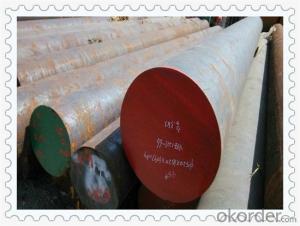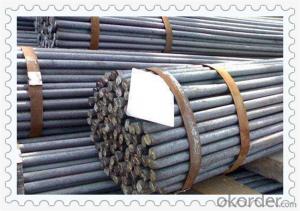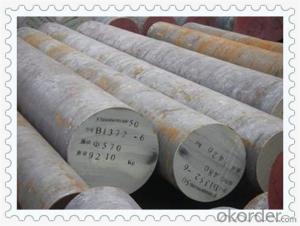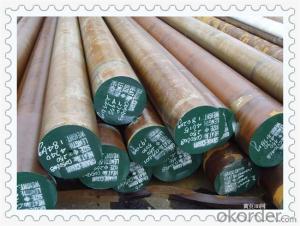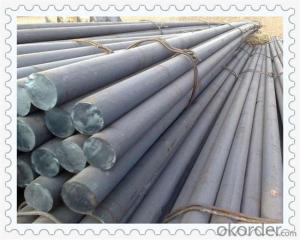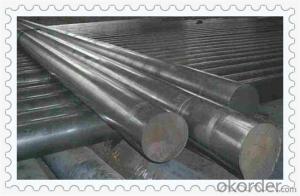DC53/ Cr8Mo1VSi Forged Tool Steel Round Bar
- Loading Port:
- China main port
- Payment Terms:
- TT OR LC
- Min Order Qty:
- 5 m.t.
- Supply Capability:
- 100000 m.t./month
OKorder Service Pledge
Quality Product, Order Online Tracking, Timely Delivery
OKorder Financial Service
Credit Rating, Credit Services, Credit Purchasing
You Might Also Like
Item specifice
Standard:
AISI,JIS,GB,BS,DIN,API,EN,ASTM
Technique:
Hot Rolled,Cold Rolled,Cold Drawn,ERW,Forged,Saw,Extruded,EFW,Spring
Shape:
U Channel,Square,C Channel,Hexagonal,Round,Rectangular,Oval,LTZ
Surface Treatment:
Galvanized,Coated,Copper Coated,Color Coated,Oiled,Dry,Chromed Passivation,Polished,Bright,Black,PVDF Coated
Steel Grade:
Q195,Q215,Q235,Q215B,Q235B,RHB335,HRB400,200 Series,300 Series,400 Series,600 Series,SS400-SS490,10#,20#,A53(A,B)
Certification:
ISO,SGS,CE
Thickness:
as required
Length:
as required
Net Weight:
as required
DC53/ Cr8Mo1VSi Forged Tool Steel Round Bar
1. Product Description
| dc53/ Cr8Mo1VSi forged tool steel round bar | |
| feature | 1.chemical composition: C0.9-1.1 Si0.8-1.2 Mn≤0.4 Cr7.5-8.5 Mo1.8-2.2 V0.2-0.5 |
| 2.equivalent grade: GB Cr8Mo1VSi JIS DC53 | |
| 3.technical data: chemical composition,physical properties and mechanical testing as per your demand. | |
| 4.delivery condition: hot rolled or forged, annealed state black/machined/polished surface | |
| 5.dimensions: round bar dia.10-700mm length:2-6m flat bar T:20-500mm W:50-600 L:2-6m | |
6.property and application: good hardness and toughness.it is Usually used as cold work die steel material. and copper, aluminum alloys die casting mold | |
| 7.ultrasonic test: according to SEP1921-84 G3 D/d E/e. | |
| 8.process:EAF+ LF+VD+forging/rolling heat-treatment is optional | |
| packing | seaworthy packing or proper packing as per your requirement |
| sample | 1.hand samples times: within 7-15days |
| 2.samples charge: sample is free according to special grades in stock | |
| 3.samples refund: negotiation | |
| 4.send samples: via TNT,UPS,FedEx,DHL | |
| Payment | T/T,30%deposit, balance paid before shipment. |
| delivery time | within 7-30days according to quantity |
| shipping port | Shanghai Port or China main port |
2. Our Main Products
| Cold work tool steel | |
| AISI | L1 L3 D2 D3 D6 A2 A5 O1 O2 6F7 |
| DIN | 1.2067 1.2080 1.2363 1.2379 1.2436 1.2510 1.2550 1.2746 1.2767 1.2842 |
| JIS | SKD1 SKD11 SKD12 SNCM2 SUJ2 DC53 |
| Hot work tool steel | |
| AISI | H10 H11 H12 H13 H21 L6 |
| DIN | 1.2343 1.2344 1.2365 1.2367 1.2581 1.2714 1.2885 |
| JIS | SKD5 SKD 6 SKD61 SKT4 |
| Plastic mould steel | |
| AISI | 420SS 420H P20 P20+Ni P20+S |
| DIN | 1.2083 1.2085 1.2311 1.2312 1.2316 1.2738 |
| JIS | NAK80 |
| High speed tool steel | |
| T42 M35 M42 T4 T5 M2 M3-2 M1 M7 M4 T1 | |
| Alloy steel/tool steel | |
| AISI | 9840 4340 5140 4135 4140 4145 |
| DIN | 1.6510 1.6511 1.6580 1.6582 1.7035 1.7214 1.7220 1.7225 1.7228 |
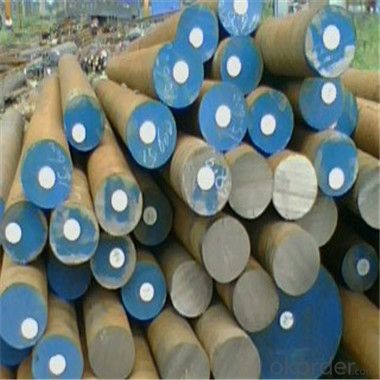
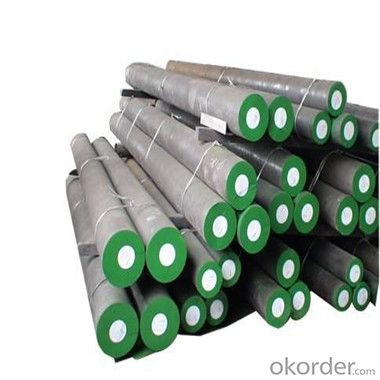
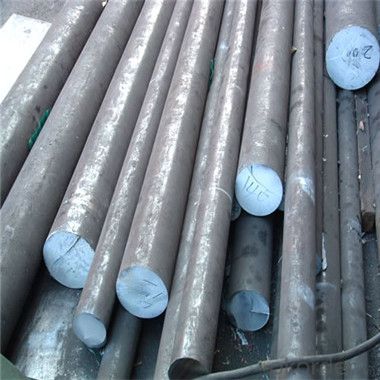
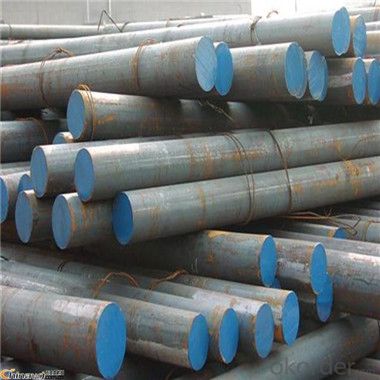
- Q:What are the different types of carbon steel round bars?
- There are several different types of carbon steel round bars, including low carbon steel, medium carbon steel, and high carbon steel. Each type has varying levels of carbon content, which determines its strength and hardness. Low carbon steel round bars have the lowest carbon content and are more easily welded and formed. Medium carbon steel round bars have a higher carbon content and are stronger and more durable, making them suitable for applications that require higher strength. High carbon steel round bars have the highest carbon content and are extremely strong and hard, making them ideal for applications that require maximum strength and wear resistance.
- Q:Can steel round bars be used for shafts or axles?
- Yes, steel round bars can be used for shafts or axles. Steel round bars are commonly used in various industries, including automotive, machinery, and construction, for their strength, durability, and versatility. They are often chosen for shafts or axles due to their ability to withstand heavy loads, provide reliable support, and resist wear and tear. Steel round bars can be machined and heat-treated to meet specific requirements, making them suitable for use as shafts or axles in various applications where strength and reliability are crucial, such as in vehicles, industrial equipment, and rotating machinery.
- Q:Can steel round bars be cut to custom lengths?
- Yes, steel round bars can be cut to custom lengths.
- Q:What are the corrosion resistance properties of steel round bars?
- Steel round bars have excellent corrosion resistance properties due to the presence of alloying elements such as chromium, nickel, and molybdenum. These elements form a protective oxide layer on the surface of the steel, which prevents the underlying metal from coming into contact with corrosive substances. The chromium in steel round bars reacts with oxygen in the air to form a thin, invisible layer of chromium oxide. This layer acts as a barrier, protecting the steel from further oxidation and corrosion. Nickel and molybdenum enhance the corrosion resistance of steel by increasing its resistance to pitting, crevice corrosion, and chloride-induced stress corrosion cracking. In addition to alloying elements, the manufacturing process can also affect the corrosion resistance of steel round bars. For instance, stainless steel round bars are often passivated, which involves the removal of free iron and other contaminants from the surface. Passivation enhances the corrosion resistance of the steel by creating a clean and inert surface that is less prone to corrosion. Overall, steel round bars are known for their excellent corrosion resistance properties, making them suitable for a wide range of applications in various industries, including construction, marine, automotive, and aerospace.
- Q:Can steel round bars be used for making bearings?
- Making bearings can indeed involve the use of steel round bars. However, it is crucial to acknowledge that the suitability of steel round bars for bearing applications relies heavily on the specific type of steel utilized and the manufacturing process employed. Bearings commonly encounter high loads and necessitate qualities such as good wear resistance, low friction, and high durability. For this reason, steel round bars made from top-notch alloy steels, such as chrome steel or stainless steel, are frequently employed in bearing production due to their exceptional mechanical properties. These steel round bars undergo particular heat treatment procedures, such as quenching and tempering, to enhance their hardness, strength, and wear resistance. Moreover, the round bars are usually machined with precise tolerances to ensure proper fit and alignment within the bearing assembly. To guarantee the most optimal performance, reliability, and longevity of bearings under various operating conditions, it is essential to seek advice from materials and manufacturing experts or consult industry standards. This will ensure the appropriate selection of steel round bar material and manufacturing processes for bearing applications.
- Q:Are steel round bars suitable for marine environments?
- Yes, steel round bars can be suitable for marine environments, but it depends on the specific type of steel used and the conditions of the marine environment. Stainless steel is often the preferred choice for marine applications due to its excellent corrosion resistance properties. Stainless steel contains chromium, which forms a protective layer on the surface of the steel, preventing corrosion and rusting. However, not all steel round bars are suitable for marine environments. Carbon steel, for example, is more susceptible to corrosion in marine environments, especially in the presence of saltwater. Carbon steel should be carefully protected with coatings or treatments to prevent corrosion. Additionally, the conditions of the marine environment also play a significant role in determining the suitability of steel round bars. Factors such as the salinity of the water, exposure to chemicals, temperature variations, and physical stress can affect the corrosion resistance of steel. In highly corrosive marine environments, it is advisable to use specialized marine-grade stainless steel or other corrosion-resistant alloys. Ultimately, it is crucial to select the appropriate grade of steel and consider additional protective measures, such as coatings or galvanization, to enhance the durability and longevity of steel round bars in marine environments.
- Q:What are the advantages of using steel round bars in construction?
- There are several advantages of using steel round bars in construction: 1. Strength and Durability: Steel round bars are known for their exceptional strength and durability. They have a high tensile strength, which means they can withstand heavy loads and provide robust support. This makes them ideal for construction projects that require structural integrity and stability. 2. Versatility: Steel round bars come in various sizes and grades, offering versatility in construction. They can be easily shaped, bent, and welded to fit specific design requirements, making them suitable for a wide range of applications. Whether it's for building frameworks, reinforcement in concrete structures, or even decorative elements, steel round bars can be tailored to meet different project needs. 3. Cost-effectiveness: Steel round bars offer cost-effectiveness in construction due to their long lifespan and low maintenance requirements. They are resistant to corrosion, weathering, and pests, which reduces the need for frequent repairs or replacements. Additionally, their strength allows for the utilization of lighter construction materials, leading to potential cost savings in the overall project. 4. Fire Resistance: Steel round bars have excellent fire-resistant properties, making them a safe choice for construction. They do not burn, melt, or emit toxic fumes under high temperatures, which can be crucial in preventing the spread of fire and ensuring the safety of occupants. 5. Sustainability: Steel is a highly sustainable material as it is 100% recyclable. Using steel round bars in construction contributes to reducing environmental impact by minimizing waste and conserving natural resources. Additionally, the process of recycling steel requires less energy compared to manufacturing it from raw materials, making it an eco-friendly choice. 6. Availability and Quality Control: Steel round bars are readily available in the market, making them easily accessible for construction projects. Moreover, their production undergoes strict quality control measures, ensuring consistent and reliable material properties. This guarantees the structural integrity and safety of the constructed buildings or infrastructures. In conclusion, the advantages of using steel round bars in construction include their strength, versatility, cost-effectiveness, fire resistance, sustainability, availability, and quality control. These attributes make them a popular choice for builders and engineers seeking reliable and efficient materials for their construction projects.
- Q:What are the advantages of using nickel-copper alloy steel round bars?
- Nickel-copper alloy steel round bars offer several advantages. Firstly, their resistance to corrosion and oxidation is excellent, making them ideal for use in harsh environments like the marine or chemical industries. This ensures the longevity and durability of the bars, reducing the need for frequent replacements. Secondly, these round bars have outstanding mechanical properties. The addition of nickel and copper enhances their strength, toughness, and hardness, making them suitable for heavy-duty applications in construction, manufacturing, and engineering. They can withstand heavy loads and resist deformation or breakage, contributing to the overall safety and reliability of the structures or components they are used in. Another advantage is their excellent thermal stability. The alloy has a low coefficient of thermal expansion, allowing it to withstand high temperatures without significant dimensional changes. This is particularly important in applications involving extreme heat, such as in the aerospace or power generation industries. The thermal stability of the bars ensures their dimensional integrity, reducing the risk of warping or cracking under high-temperature conditions. Furthermore, Nickel-copper alloy steel round bars offer good electrical conductivity. This is beneficial in applications that require the transmission of electric current, such as electrical wiring or power distribution systems. The high electrical conductivity of the alloy ensures efficient and reliable electrical connections, minimizing power loss and maximizing performance. In conclusion, the advantages of nickel-copper alloy steel round bars include excellent corrosion resistance, superior mechanical properties, thermal stability, and good electrical conductivity. These characteristics make them suitable for a wide range of applications in various industries, providing durability, strength, and reliability.
- Q:What is the difference between a centerless ground and a polished steel round bar?
- A centerless ground steel round bar and a polished steel round bar are both types of steel bars that have undergone different finishing processes, resulting in distinct qualities and characteristics. A centerless ground steel round bar is produced by grinding the surface of the steel bar using a specialized machine called a centerless grinder. This process removes any imperfections or irregularities on the surface, resulting in a smooth and uniform finish. The centerless grinding process also ensures that the diameter of the bar remains consistent throughout its length. This makes centerless ground steel round bars ideal for applications that require precise dimensions and a smooth surface, such as in machining operations or as a base material for further processing. On the other hand, a polished steel round bar is achieved through a polishing process, where the surface of the steel bar is buffed and polished using abrasive materials. This process helps to enhance the aesthetic appearance of the steel bar, giving it a shiny and reflective surface. Unlike centerless grinding, polishing does not involve removing material from the surface but rather smoothing and refining it. Polished steel round bars are often used in decorative applications, such as in architecture, interior design, or as components in high-end furniture. In summary, the main difference between a centerless ground steel round bar and a polished steel round bar lies in the finishing process. Centerless grinding focuses on achieving precise dimensions and a smooth surface, making it suitable for functional applications. On the other hand, polishing aims to enhance the visual appeal of the steel bar, making it more suitable for decorative purposes.
- Q:What are the different types of steel round bars used in the automotive braking systems?
- There are several different types of steel round bars that are commonly used in automotive braking systems. These types of steel are specifically chosen for their strength, durability, and ability to withstand the high temperatures and pressures that are generated during braking. One commonly used type of steel round bar is carbon steel. This type of steel is known for its high strength and excellent hardness. Carbon steel round bars are often used in the manufacturing of brake rotors and brake drums. They are able to withstand the friction and heat generated during braking, ensuring reliable performance and longevity. Another type of steel round bar used in automotive braking systems is stainless steel. Stainless steel is highly resistant to corrosion and rust, making it ideal for brake lines and fittings. It also has good heat resistance properties, allowing it to withstand the thermal stresses generated during braking. Some automotive braking systems also utilize alloy steel round bars. Alloy steel is a combination of different metals, such as chromium, nickel, and molybdenum, which enhance its mechanical properties. Alloy steel round bars are known for their high tensile strength and toughness, making them suitable for applications that require a high level of performance and durability. In addition to these commonly used types of steel round bars, there are also specialized types that are designed for specific applications within automotive braking systems. For example, heat-treated steel round bars are used in the manufacturing of brake calipers and pistons, as they can withstand the extreme temperatures generated by the friction between the brake pads and rotors. Overall, the choice of steel round bar in automotive braking systems depends on the specific requirements of the application, such as strength, durability, heat resistance, and corrosion resistance. By selecting the appropriate type of steel, automotive manufacturers can ensure the safety and reliability of their braking systems.
1. Manufacturer Overview |
|
|---|---|
| Location | |
| Year Established | |
| Annual Output Value | |
| Main Markets | |
| Company Certifications | |
2. Manufacturer Certificates |
|
|---|---|
| a) Certification Name | |
| Range | |
| Reference | |
| Validity Period | |
3. Manufacturer Capability |
|
|---|---|
| a)Trade Capacity | |
| Nearest Port | |
| Export Percentage | |
| No.of Employees in Trade Department | |
| Language Spoken: | |
| b)Factory Information | |
| Factory Size: | |
| No. of Production Lines | |
| Contract Manufacturing | |
| Product Price Range | |
Send your message to us
DC53/ Cr8Mo1VSi Forged Tool Steel Round Bar
- Loading Port:
- China main port
- Payment Terms:
- TT OR LC
- Min Order Qty:
- 5 m.t.
- Supply Capability:
- 100000 m.t./month
OKorder Service Pledge
Quality Product, Order Online Tracking, Timely Delivery
OKorder Financial Service
Credit Rating, Credit Services, Credit Purchasing
Similar products
New products
Hot products
Related keywords
